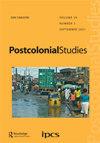Anti-colonial connectivity between Islamicate movements in the Middle East and South Asia: the Muslim Brotherhood and Jamati Islam
IF 1.8
3区 社会学
Q2 CULTURAL STUDIES
引用次数: 0
Abstract
ABSTRACT With almost every part of the Muslim world having suffered from European colonisation, the roles and relations of Islamicate movements in anti-colonial history cannot be ignored. And yet, despite intellectual overlaps, mutual opposition to British colonialism, and a shared spiritual worldview, little has been written within postcolonial studies on the historical relationship between the Muslim Brotherhood in Egypt and Jamati Islam in South Asia. I explore the link between both movements as an example of anti-colonial connectivity that transcended territory. Though disconnected by geography and language, both groups were nevertheless tied by the deep connection of a shared belief system and the common experience of British imperialism. In particular, I argue their theology was not incidental but fundamental to both their anti-colonialism and their connectivity. I consider how that connectivity and solidarity evolved through time and shifting locations, reflecting the rich inheritance not just of post-colonies, but also of diasporic communities in the imperial metropole, inhabiting liminal spaces of unbelonging who often found community via these transnational movements. The purpose of the article is a recovery of history and a recognition of (at times overlooked) anti-colonial struggles and solidarities that do not fit neatly within disciplinary postcolonial norms.中东和南亚伊斯兰运动之间的反殖民联系:穆斯林兄弟会和伊斯兰教徒
由于穆斯林世界几乎每个地区都遭受过欧洲殖民统治,伊斯兰运动在反殖民历史上的作用和关系不容忽视。然而,尽管思想上有重叠,双方都反对英国殖民主义,并且有共同的精神世界观,但在后殖民时期,关于埃及穆斯林兄弟会和南亚伊斯兰教徒之间历史关系的研究却很少。我探讨了这两个运动之间的联系,作为一个超越领土的反殖民联系的例子。尽管由于地理和语言的原因,这两个群体彼此隔绝,但共同的信仰体系和共同的英帝国主义经历却将这两个群体紧密联系在一起。特别是,我认为他们的神学不是偶然的,而是他们反殖民主义和联系的基础。我考虑了这种联系和团结是如何随着时间和地点的变化而演变的,这不仅反映了后殖民地的丰富遗产,也反映了帝国大都市中散居的社区的丰富遗产,这些社区居住在不属于他们的有限空间中,他们经常通过这些跨国运动找到社区。这篇文章的目的是恢复历史,并承认(有时被忽视的)反殖民斗争和团结,这些斗争和团结不完全符合后殖民的纪律规范。
本文章由计算机程序翻译,如有差异,请以英文原文为准。
求助全文
约1分钟内获得全文
求助全文

 求助内容:
求助内容: 应助结果提醒方式:
应助结果提醒方式:


